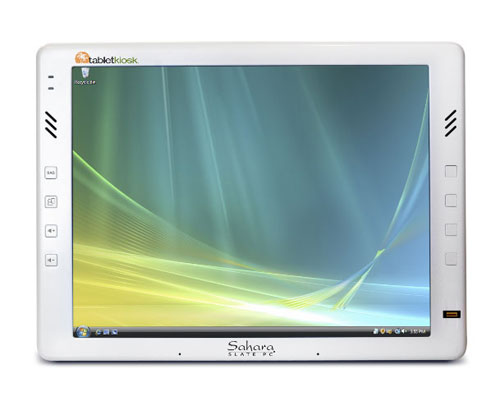
Many people are betting that 2010 will be the year of the tablet computer.
Surely, we've heard such predictions about tablets before. This time, the reasoning goes, is different, because the devices will have more sophisticated touch screens and consumers are more used to virtual keyboards. Most importantly, Apple just might be jumping into the fray.
Tablets, you may recall, are either laptops with a screen that twists and folds flat and uses a stylus or fingertip for input, or something more like an oversize iPod Touch that's used for tasks like checking e-mail, getting on the Web, and watching videos.
True, market researchers at DisplaySearch predict sales for all touch-screen devices will be growing from $3.5 billion this year to more than $6 billion by 2012. But if 2010 is going be the year of the tablet--meaning regular folks start buying these en masse--someone has to get it right.
So far, we're still waiting.
Toshiba, Archos, Fujitsu, and Lenovo have touch-screen tablets coming our way in the next few months, none of which should revolutionize our already established expectations of tablet PCs.
That hasn't stopped people like Toshiba executive Marco Perino from declaring that "home multimedia tablets will be one of the fastest-growing products in the consumer electronics space." Fujitsu's Troy Nakamura said it's the right time for tablets this time around because "people (are) using touch in their daily lives with smartphones, airport kiosks, ATMs...we're becoming more conditioned to use hands and fingers on certain machines. The tablet fits nicely into that."
But do we really need yet another mobile form factor for accessing the Web and watching videos? The hottest computing category at the moment is Netbooks, which grew 40 percent during the second quarter of this year compared with the same quarter a year earlier. That's almost twice as fast as the rate of traditional notebooks, which grew 22 percent.
As these more traditional types of mobile computers continue to fly off the shelves, it begs the question: Why do we need tablets?
An Apple touch-screen tablet--discussed ad nausem by the tech press, including at CNET--may or may not appear at the beginning of early 2010. CEO Steve Jobs himself is said to be overseeing the project, but there's no concrete evidence it actually exists.
Apple does have an established reputation of thinking thoroughly through any prospective market and coming up with a product that ties hardware and software together in a simple way that often becomes a personal fashion statement, as with the iPhone and iPod.
But whether Cupertino is targeting this niche of computing or not, it takes more than one competitor to make a trend. In fact, the old saying in newsrooms is that if you have three of something, you have a trend.
Tablet fans can at least say they've got a trend. Toshiba and Archos, among others, are jumping into the fray with touch-screen tablets coming this fall. Plus, there's a rumor that Dell and Intel are collaborating on a similar device. And in the commercial PC sector, Hewlett-Packard, and now Lenovo and Fujitsu, are taking advantage of the gesture support in Windows 7 to offer their convertible PCs with touch-screen capability.
While it's certainly easier to manufacture touch-screen devices cheaper now, and people are showing a distinct taste for being online everywhere and always, execution is key. And for consumers to really embrace this, there needs to be a compelling reason to spend money on yet another computing device.
Toshiba's effort is a smaller media tablet, called the JournE Touch and introduced at IFA in Berlin last week, and on the outside it looks nice enough. It has a 7-inch screen with large touchable icons for quick access to media, photos, Internet, and more, and it's very thin and light.
It has integrated Wi-Fi and can be used to connect to a TV to watch Web content on a larger screen. It's kind of like a giant iPod Touch. But it uses Windows CE, not exactly the bleeding edge of mobile operatings systems. And even besides that, there's nothing really buzzworthy or interesting about it, certainly nothing that's going to set the category on fire.
Archos, known mostly for its media players, is also doing its first PC tablet. But theirs comes with the shiny new Windows 7 Starter Edition installed. Though the version we saw isn't yet a finished product, the device feels heavy and the onscreen keyboard isn't the easiest to manipulate. Otherwise it feels very much like an ultramobile PC (UMPC) or mobile Internet device (MID) we would have seen a few years back, with the exception of the touch screen and the price. At $499 it is a relative bargain when compared with what Apple is rumored to be charging for its tablet (between $800 and $1,000, reportedly).
But who will use it?
But the bigger problem comes to light when it comes to who will use a touch-screen tablet. Fred Balay, Archos vice president of marketing, brings out the same old user demographics that seem to get referenced whenever there's a new, not-so-focused category of computing to be sold: so-called "road warriors"--wealthy execs who travel often or employees whose companies can buy these for them--and people with enough disposable income to buy a fun new "entertainment device."
While that's certainly a fat-cat crowd, that's not a mainstream audience.
Archos is new to this particular category, it's not a good sign that its fortunes here could depend on another company. Balay said last week that "We'd love Apple to be in this...they will create a market."
So will next year be the year of the tablet? Don't bet on it. Even Apple could see some apathy from the vast majority of folks that don't likely need a third device beyond their iPhone or BlackBerry and a laptop.
Will next year be the year of the tablet?
hbailla, Thursday, September 17, 2009
Subscribe to:
Post Comments (Atom)




Comments :
Post a Comment